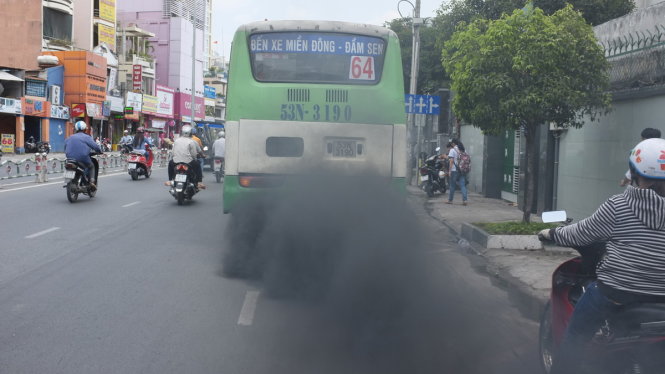Vietnam’s Ministry of Transport has called on the government to postpone a mandatory European emission standard upgrade for new road vehicles in the country, citing unpreparedness, despite it having been given a five-year window for preparation.
In 2011, the government issued a resolution stipulating that all types of new cars to be used in Vietnam, both imported and domestically assembled, must meet the Euro 4 exhaust emission standard, instead of the lower Euro 2, from January 1, 2017.
The mandatory upgrade, from Euro 2 to Euro 3, was also approved for motorbikes with the same deadline.
Currently applied in several countries, the Euro emission standards, set by the European Union, stipulate the average emission targets for such toxic substances as carbon monoxide (CO) or carbon dioxide (CO2) that new road vehicles must meet.
The Euro 2, introduced in 1997, set the CO emission target at 4g/kWh, and the later Euro 4, effective in 2011, lowered the ratio to 1.5g/kWh.
Even though ministries and relevant sectors had more than five years to prepare and make necessary changes to follow the compulsory upgrade, the transport ministry called for a deadline extension for several kinds of vehicles in a document submitted to the government in mid-January.
The transport ministry said it was not immediately possible in terms of technology to manufacture new vehicles that meet the Euro 4 standard, thus asking to be given “more time for preparation.”
The ministry wanted to delay the Euro 4 upgrade for several diesel-powered vehicles, including passenger cars, pickup trucks and vans, to January 1, 2018, and to as late as January 1, 2022 for other trucks that also run on diesel.
As for motorbikes and vehicles using gasoline, biofuel, liquefied petroleum and natural gas, the transport ministry said manufacturers should follow the upgrade deadline.
Diesel-fueled passenger cars and trucks are popular in Vietnam and known as the main cause of street pollution.

The transport ministry said most manufacturers of those means of transportation in Vietnam have yet to obtain the Euro 4 certificate as they are making products reaching lower standards, hoping that the government would change its mind on the mandatory upgrade.
As of December 31, 2016, only six types of car engines had been certified as meeting the Euro 4 standard, according to the ministry.
In the meantime, it is also an issue for the standardized vehicles to find qualified fuel to run on in Vietnam.
A petrol product must have a maximum lead content of 0.005 grams per liter to achieve the Euro 4 standard, compared to 0.013 g/l of the Euro 2.
However, Dung Quat Refinery, Vietnam’s only operational oil refinery that currently meets some 30 percent of the domestic fuel demand, is unable to produce such standardized petrol products, its operator BSR has admitted.
“Our facility was designed in 1999 and commissioned in 2009, whereas the Euro 4 was introduced in 2011,” BSR chairman Nguyen Hoang Giang told Tuoi Tre (Youth) newspaper.
The refinery needs to be expanded and upgraded to be able to produce the Euro 4-level fuel, Giang said.
“The upgrade and expansion may finish in 2022 or 2023, after which we will be able to produce fuel products that meet even the Euro 5 standard,” Giang claimed, adding that the facility’s products now satisfy the Euro 3 standard only.
According to the transport ministry, the Vietnam Automobile Manufacturers' Association has also cited the lack of proper fuel to call for a delay to the Euro 4 upgrade, saying “car engines will break down easier without suitable fuel.”
Environmentalists displeased
With the transport ministry’s petition effectively meaning vehicles living up to low emission standards would be allowed to continue running in Vietnam, some environment agencies are not pleased.

Professor Pham Ngoc Dang, deputy head of the Vietnam Association for Conservation of Nature and Environment (VACNE), said the ministry’s request is unreasonable, given the five-year window relevant entities were given to prepare for the upgrade.
“Delaying the emission standard upgrade is going against the goal of sustainable and environment-friendly development and worsens the current emission pollution, which is already at an alarming rate, in cities and provinces countrywide,” Prof. Dang underlined.
The professor said car and motorbike exhaust emissions currently account for 70 percent of the air pollution in urban areas across Vietnam, so “instead of being put off, the upgrade implementation should be sped up.”
Vietnam now has some 2.5 million automobiles, 1.5 million of which are trucks and passenger cars using diesel fuel, according to statistics obtained by Tuoi Tre.
With this number increasing by 200,000 units per year, some experts are concerned that failing to mandate higher emission standards for new vehicles would lead to worse environmental pollution.
Like us on Facebook or follow us on Twitter to get the latest news about Vietnam!




















































